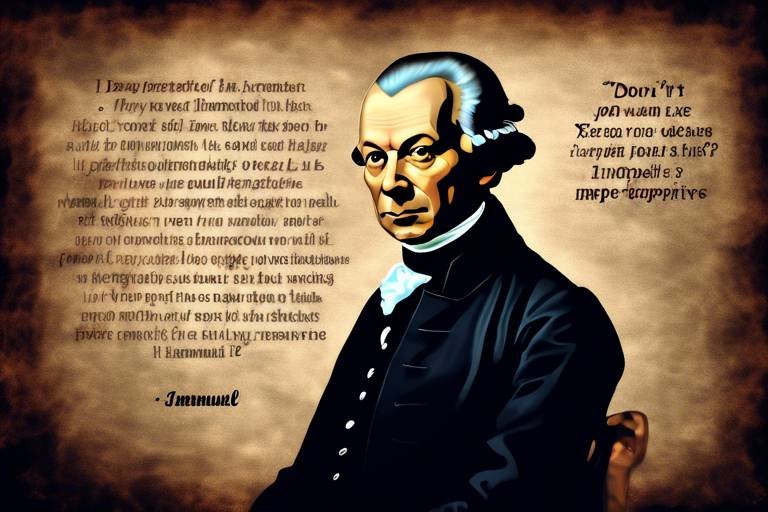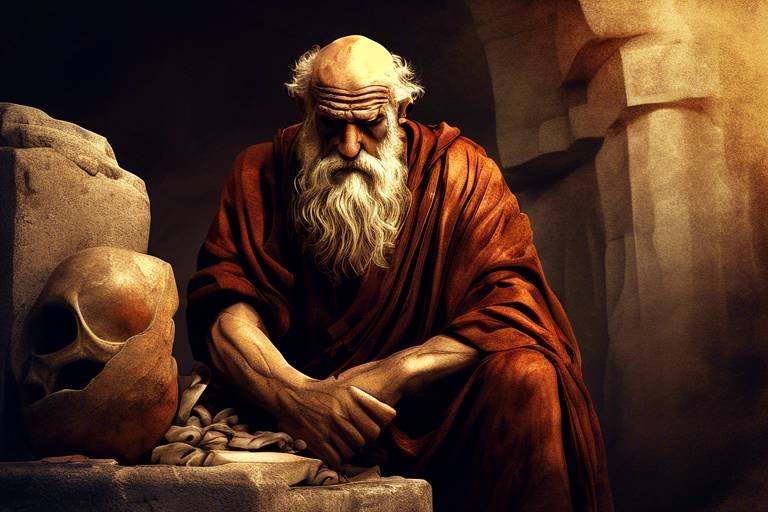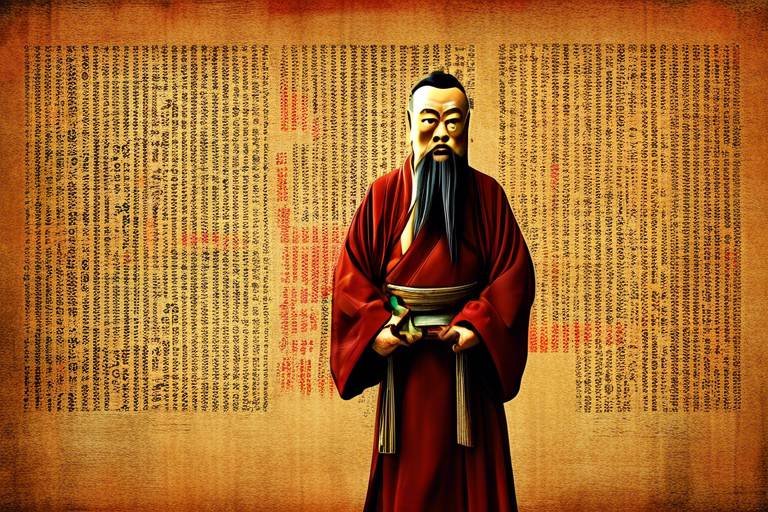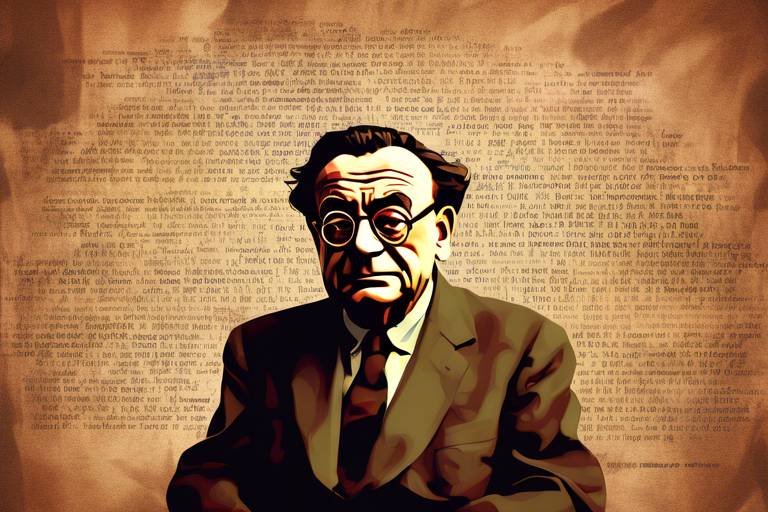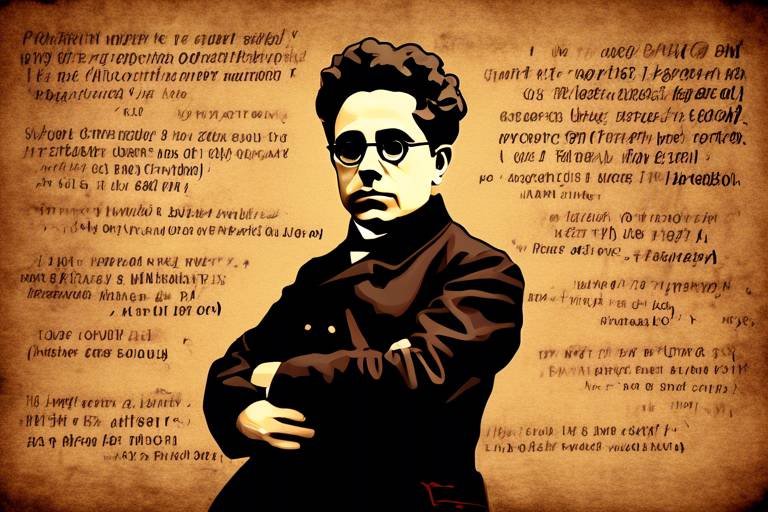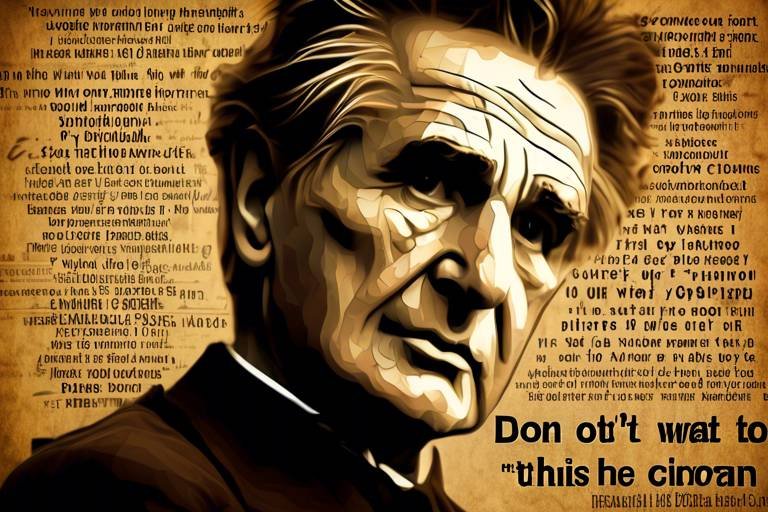Mozi's Advocacy of Universal Love in Chinese Philosophy
In the vast tapestry of Chinese philosophy, few figures stand out as prominently as Mozi, whose teachings resonate through the ages. Mozi, also known as Mo Tzu, was a philosopher who lived during the Warring States period, a time marked by conflict and strife. His advocacy of universal love—or jian ai—challenges the traditional Confucian ideals that dominated the moral landscape of his time. Imagine a world where love transcends familial ties and extends to all humanity; this is the vision Mozi sought to promote. His ideas not only stirred the pot of philosophical discourse in ancient China but also laid the groundwork for discussions on compassion and altruism that are still relevant today.
Mozi's philosophy is a clarion call for a more equitable society, where the well-being of others is prioritized alongside one's own. He argued that true love should not be limited to one's family or close friends but should encompass all people, regardless of their background or relationship to us. This radical notion was not merely an abstract concept for Mozi; it was a practical guideline for living in harmony with others. By championing universal love, Mozi aimed to create a society where social harmony could flourish, a stark contrast to the often self-serving nature of human relationships.
As we delve deeper into Mozi's teachings, we uncover a rich philosophical framework that critiques the Confucian emphasis on familial loyalty. While Confucianism holds that loyalty to family is paramount, Mozi contended that such a narrow focus could lead to division and conflict. Instead, he proposed that if everyone practiced universal love, the world would be a more peaceful place. This idea can be likened to the ripples created when a stone is thrown into a pond; the effects of one act of love can spread far and wide, influencing others and fostering a culture of compassion.
In essence, Mozi's advocacy for universal love is not just a philosophical stance; it is a call to action. It challenges us to reconsider our relationships with others and to cultivate a sense of empathy that transcends boundaries. As we navigate our modern world, with its myriad social issues and conflicts, the principles of universal love offer a guiding light. They remind us that compassion and altruism are not merely ideals to aspire to; they are essential ingredients for social harmony and collective well-being.
- What is universal love according to Mozi? Universal love, or jian ai, is the principle that advocates for love and care for all individuals, regardless of their relationship to us.
- How does Mozi's philosophy differ from Confucianism? While Confucianism emphasizes loyalty to family and social hierarchy, Mozi promotes a broader love that includes all humanity.
- Why is Mozi's philosophy relevant today? In a world facing social divisions and conflicts, Mozi's call for universal love encourages empathy and cooperation among diverse communities.

Understanding Mozi's Philosophy
Mozi, also known as Mo Tzu, stands as a towering figure in the landscape of ancient Chinese philosophy. Living during the Warring States period, a time riddled with chaos and conflict, he sought to provide a framework that could unite people through a shared sense of compassion. His philosophy, which revolves around the concept of universal love (jian ai), challenges the traditional Confucian ideals that prioritize familial loyalty and hierarchical relationships. Instead of focusing solely on one’s family or close relationships, Mozi proposed that we should extend our love to all individuals, regardless of their social status or personal connections.
To truly grasp Mozi's philosophy, we must consider the historical context in which he operated. The Warring States period was marked by intense rivalry among various states, leading to widespread suffering and a breakdown of social cohesion. In response, Mozi argued that the root of social discord was the lack of compassion among people. He believed that if everyone practiced universal love, society would transform into a more harmonious and just environment. This idea was revolutionary, as it called for a radical shift in how individuals perceive their responsibilities toward others.
At the core of Mozi's teachings is the principle that love should not be limited to one’s immediate circle. He posited that true altruism involves caring for all humanity, which he viewed as essential for achieving social harmony. Mozi's philosophy can be summarized by a few key tenets:
- Universal Love: The belief that we should love all people equally, transcending personal biases.
- Meritocracy: Emphasizing the importance of merit over social class, advocating for a society where individuals are valued based on their contributions.
- Condemnation of Aggression: Opposing war and violence, promoting peaceful resolutions to conflict.
Mozi's advocacy for universal love was not merely a philosophical abstraction; it was a call to action. He urged individuals to practice compassion and to engage in behaviors that foster mutual respect and understanding. This approach not only aimed to alleviate suffering but also sought to build a foundation for a more equitable society. In Mozi's view, love was a practical tool for social reform, capable of transforming the fabric of society.
In conclusion, understanding Mozi's philosophy requires us to appreciate both its historical context and its profound implications for human relationships. His call for universal love challenges us to reconsider our own views on compassion and altruism. In a world that often prioritizes individualism and competition, Mozi’s teachings serve as a poignant reminder of the power of love to unite and heal.

The Concept of Universal Love
At the heart of Mozi's philosophy lies the profound idea of universal love, known in Chinese as jian ai. This concept is not merely a call for affection; it is a radical challenge to the prevailing norms of Mozi's time. While Confucianism emphasized loyalty to family and social hierarchies, Mozi proposed a more inclusive approach. He argued that love should extend beyond the confines of familial obligations to encompass all people, regardless of their relationship to us. This idea invites us to rethink our connections and responsibilities to others, promoting a sense of unity and shared humanity.
So, what exactly does universal love entail? In Mozi's view, it is characterized by the following principles:
- Equality: Mozi believed that all individuals are deserving of love and respect, irrespective of their social status or background.
- Compassion: Universal love calls for an empathetic response to the suffering of others, urging individuals to act in ways that alleviate pain and promote well-being.
- Altruism: The philosophy encourages selfless actions, where individuals prioritize the needs of others over their own interests.
This radical notion of love not only sought to foster personal relationships but also aimed to create a more just society. Mozi envisioned a world where individuals would act with compassion and mutual respect, thereby cultivating social harmony. In a time when loyalty to family was often prioritized over the welfare of the greater community, Mozi's teachings were revolutionary. He posited that if everyone practiced universal love, society would be free from conflict and strife, leading to a more equitable and peaceful existence.
Moreover, Mozi's idea of universal love can be likened to a ripple effect in a pond. When a single stone is thrown into the water, the ripples expand outward, touching every part of the surface. Similarly, when one person practices universal love, it can inspire others to do the same, creating a chain reaction of kindness and understanding. This interconnectedness is crucial in addressing societal issues, as it encourages collective responsibility for the well-being of all.
However, it's essential to recognize that the concept of universal love is not without its challenges. Critics have pointed out that such an expansive view of love can lead to emotional fatigue or a sense of overwhelm. After all, how can one possibly care for everyone equally? Mozi's response would likely emphasize the importance of intention and action over mere feelings. It's about making conscious choices to extend compassion and support to others, even when it feels daunting.
In summary, Mozi's advocacy for universal love presents a compelling vision of how we can interact with one another. By embracing this philosophy, we are not only enhancing our personal relationships but also paving the way for a more harmonious society. As we navigate the complexities of modern life, the principles of universal love remain as relevant today as they were in ancient China, reminding us of the power of compassion and altruism in fostering a better world.

jian ai,
This article explores Mozi's philosophy of universal love, its implications in Chinese thought, and its relevance in contemporary society, highlighting the importance of compassion and altruism in fostering social harmony.
Mozi, an influential figure in ancient Chinese philosophy, introduced the concept of universal love, challenging Confucian ideals. This section delves into his foundational beliefs and the historical context of his teachings.
Universal love, or jian ai, is central to Mozi's philosophy. This concept is not merely about affection but represents a profound ethical stance advocating for the love of all people without discrimination. Mozi argued that true morality is rooted in the ability to care for others equally, transcending familial bonds and personal interests. His approach was revolutionary for its time, as it proposed that love should not be limited to one’s family or close friends but extended to all humanity. This notion of love is not just a feeling but a guiding principle that should inform actions and decisions in daily life.
In contrast to the more traditional Confucian view, which emphasized filial piety and loyalty to family, Mozi's idea of jian ai encouraged individuals to think beyond their immediate relationships. He believed that if everyone practiced universal love, society would become more harmonious and just. This idea can be likened to a ripple effect; when one person acts with compassion, it inspires others to do the same, creating a wave of goodwill that can transform communities.
Moreover, Mozi's philosophy posited that universal love could lead to practical benefits. For instance, when people prioritize the well-being of others, it fosters trust and cooperation. Mozi envisioned a society where individuals would work together for the common good, leading to a more equitable distribution of resources and opportunities. In this light, jian ai serves as both an ethical framework and a practical strategy for societal improvement.
This subheading discusses the fundamental differences between Mozi's advocacy for universal love and Confucian emphasis on familial loyalty, exploring how these contrasting views shaped Chinese moral philosophy.
Mozi believed that universal love fosters social harmony. This section explains how his ideas aimed to create a more equitable society through compassion and mutual respect among individuals.
Despite its noble intentions, Mozi's philosophy faced criticism. This part addresses the objections raised by contemporaries and later philosophers regarding the practicality and emotional implications of universal love.
Mozi's ideas significantly influenced Chinese philosophy and ethics. This section highlights his lasting impact on subsequent thinkers and how his advocacy for universal love resonates through Chinese history.
In today's world, Mozi's philosophy remains relevant. This section explores how universal love can be applied to modern social issues, promoting empathy and cooperation in diverse communities.
This subheading presents examples of how universal love manifests in various social movements and initiatives, illustrating its practical applications in fostering understanding and compassion among people.
Implementing universal love in contemporary society faces challenges. This section discusses the barriers to fostering altruism and how individuals and communities can work to overcome these obstacles.
- What is jian ai?
Jian ai is the concept of universal love in Mozi's philosophy, advocating for love and compassion towards all individuals, not just family or friends. - How does Mozi's philosophy differ from Confucianism?
While Confucianism emphasizes familial loyalty and relationships, Mozi's philosophy promotes love for all humanity equally. - Why is universal love important in today's society?
Universal love fosters empathy, cooperation, and social harmony, which are essential for addressing contemporary social issues.

is central to Mozi's philosophy. This section examines its definition, principles, and how it contrasts with other philosophical perspectives in ancient China, particularly Confucianism.
At the heart of Mozi's philosophy lies the profound concept of universal love, or jian ai, which advocates for an impartial and unconditional affection towards all humanity. This idea is not merely a lofty ideal but a practical guide for ethical living. Mozi believed that if individuals could extend their love beyond their immediate families and friends, society would transform into a more harmonious and equitable place. Imagine a world where compassion knows no bounds, where we treat strangers with the same kindness we reserve for our loved ones. This is precisely what Mozi envisioned.
To understand universal love, we must explore its foundational principles. Mozi argued that love should not be limited to familial ties or social hierarchies. Instead, he proposed that everyone deserves equal consideration and respect. This principle starkly contrasts with the Confucian emphasis on filial piety, which prioritizes loyalty to family above all else. While Confucianism teaches that our duties and affections should be directed towards our relatives, Mozi challenged this notion by asserting that such a narrow focus leads to societal discord and inequality.
The principles of universal love can be summarized as follows:
- Impartiality: Love should be directed towards all people, regardless of their relationship to us.
- Compassion: A genuine concern for the welfare of others is essential for social harmony.
- Action-oriented: Universal love calls for actionable steps to help others, not just feelings of goodwill.
In stark contrast to Mozi’s vision, Confucianism promotes a hierarchical view of relationships, where loyalty to family takes precedence over broader societal concerns. Confucius famously stated that “the father is to be honored above all,” which can lead to a narrow-minded approach to ethics. Mozi, however, argued that such a perspective fosters inequality and injustice. He believed that by prioritizing love for all, we can dismantle barriers that divide us and cultivate a sense of community and mutual respect.
Mozi’s advocacy for universal love also emphasizes the importance of rationality in ethical decision-making. He encouraged individuals to use logic and reason to guide their actions, rather than relying solely on tradition or emotional ties. This rational approach aims to create a society where decisions are made for the collective good, rather than personal gain. By applying reason to our relationships, we can ensure that our love is not only profound but also practical and impactful.
In conclusion, the concept of universal love is a cornerstone of Mozi's philosophy, challenging the established norms of his time. By promoting an inclusive and compassionate worldview, Mozi sought to create a society where love transcends personal boundaries. This radical idea not only reshaped Chinese philosophical thought but also continues to resonate in contemporary discussions about ethics and morality. As we navigate our modern lives, embracing the principles of universal love could be the key to fostering a more harmonious and understanding world.

Mozi vs. Confucianism
When we dive into the philosophical waters of ancient China, two titans emerge: Mozi and Confucius. They both sought to shape the moral fabric of society, yet their approaches were as different as night and day. Mozi, the proponent of universal love, argued for a love that transcends personal ties, while Confucius emphasized the importance of familial loyalty and hierarchical relationships. Imagine a world where everyone is treated equally, versus one where your worth is determined by your family connections. This fundamental divergence sets the stage for a rich philosophical debate.
Mozi's philosophy, known as jian ai, or universal love, posits that one should care for all people equally, not just those within one's immediate circle. This notion challenges the Confucian ideal that prioritizes loyalty to family and close friends. For Mozi, love should be impartial and all-encompassing, promoting social harmony by diminishing the barriers that often lead to conflict. In contrast, Confucianism teaches that moral actions should be rooted in one's relationships, which naturally leads to a prioritization of family over strangers. This raises an intriguing question: can true harmony exist in a society where love is conditional?
The implications of these philosophies extend beyond mere theory; they reflect on how society organizes itself. To illustrate, consider the following table comparing the core tenets of Mozi and Confucianism:
| Aspect | Mozi's Philosophy | Confucian Philosophy |
|---|---|---|
| Definition of Love | Universal love for all | Familial loyalty and respect |
| Social Harmony | Achieved through equal care | Achieved through proper relationships |
| Ethical Focus | Altruism and compassion | Rituals and hierarchy |
As we analyze these contrasting viewpoints, it's essential to recognize how they shaped the moral landscape of Chinese society. Mozi's emphasis on universal love sought to dismantle the barriers of class and privilege, advocating for a more egalitarian approach. Confucianism, with its deep roots in tradition and respect for authority, provided a framework that many found comforting and stable. However, this stability often came at the cost of excluding those deemed "outsiders" or "less worthy."
In essence, the clash between Mozi and Confucianism is not just a historical debate; it resonates with modern dilemmas. In a world that often prioritizes individualism and personal gain, Mozi's call for universal love is a refreshing reminder of the power of compassion and altruism. But can we truly embrace such a radical idea in a society conditioned to value loyalty over love? The answer may lie in our willingness to challenge our ingrained beliefs and consider the broader implications of our actions.

The Role of Social Harmony
Mozi's philosophy is deeply rooted in the notion of social harmony, which he believed was essential for the well-being of society as a whole. He argued that universal love, or jian ai, acts as the glue that binds individuals together, fostering a sense of community and mutual respect. Imagine a tapestry woven from countless threads, each representing a person; when these threads are intertwined with love and compassion, the result is a vibrant and resilient fabric of society.
At the core of Mozi's teachings is the idea that when individuals practice universal love, they contribute to a more equitable and harmonious society. This means treating others not just as family or friends but as part of a larger human family. By extending love and kindness to all, regardless of their background or status, we can reduce conflict and create a peaceful coexistence. Mozi's vision was not merely an idealistic dream; it was a practical solution to the social issues of his time, which still resonate today.
Furthermore, Mozi posited that social harmony is not a passive state but an active process that requires effort and commitment from everyone. He believed that individuals should engage in altruistic behaviors, which can include:
- Helping those in need without expecting anything in return.
- Promoting understanding and tolerance among different social groups.
- Encouraging open dialogue and collaboration to resolve conflicts.
This proactive approach to social harmony reflects Mozi's understanding of human nature and the complexities of social interactions. He recognized that while love is a powerful motivator, it must be coupled with action to create tangible change. In a society where everyone feels valued and respected, the potential for collaboration and innovation increases exponentially.
Moreover, Mozi's emphasis on social harmony has implications that extend beyond individual actions. It calls for systemic changes that promote equality and justice. By advocating for policies that reflect the principles of universal love, societies can work towards eradicating poverty, discrimination, and violence. This holistic view of social harmony aligns with contemporary movements that seek to address systemic injustices, demonstrating the timeless relevance of Mozi's ideas.
In conclusion, the role of social harmony in Mozi's philosophy is not just a theoretical concept; it is a call to action for individuals and communities alike. By embracing universal love, we can create a society that thrives on compassion, understanding, and cooperation. As we navigate the complexities of modern life, Mozi's teachings remind us that our collective well-being depends on our ability to love and support one another.

Critiques of Mozi's Philosophy
Despite the noble intentions behind Mozi's philosophy of universal love, it has not escaped criticism. Many contemporaries and later philosophers have raised concerns about the practicality and emotional implications of his ideas. One of the primary critiques centers on the notion that universal love, while admirable in theory, may not be feasible in practice. Critics argue that expecting individuals to extend the same level of love and care to all people, including strangers, dilutes the natural bonds formed through family and community ties. This raises the question: can we genuinely love everyone equally, or does such an expectation undermine the authenticity of our relationships?
Moreover, some philosophers contend that Mozi's emphasis on universal love could lead to a neglect of personal responsibilities. For instance, if one is to love all equally, where does that leave the obligations we have towards our families and close friends? Critics suggest that this could foster a sense of emotional detachment, making it challenging to prioritize those who are closest to us. In this sense, Mozi's philosophy might be perceived as overly idealistic, failing to account for the complexities of human emotions and social structures.
Another significant critique involves the potential for universal love to become a form of moral absolutism. Critics argue that by advocating for a single moral framework based on universal love, Mozi may inadvertently dismiss the rich tapestry of ethical perspectives that exist within society. This could lead to a lack of tolerance for differing views and practices, which are essential for a diverse and dynamic society. In essence, while universal love aims to promote harmony, it may also risk imposing a uniformity that stifles individuality and pluralism.
Lastly, the emotional implications of Mozi's philosophy are also a point of contention. Some argue that the expectation to love universally can create feelings of guilt or inadequacy in individuals who struggle to meet such high ideals. This can lead to a sense of failure, as people grapple with the reality of their emotions, which may not align with the concept of unconditional love for all. Thus, while Mozi's philosophy promotes a beautiful vision of compassion and altruism, it also invites critical reflection on the limitations and challenges of applying such ideals in our everyday lives.
In summary, while Mozi's advocacy for universal love offers profound insights into the importance of compassion and altruism, it is essential to consider the critiques surrounding its practicality and emotional ramifications. Engaging with these critiques allows for a more nuanced understanding of how to apply the principles of universal love in a way that respects the complexities of human relationships and societal dynamics.
- What is Mozi's philosophy of universal love?
Mozi's philosophy advocates for loving all individuals equally, emphasizing compassion and altruism over familial loyalty. - How does Mozi's philosophy differ from Confucianism?
While Confucianism emphasizes familial loyalty and social hierarchy, Mozi's universal love promotes equality and compassion for all, regardless of familial ties. - What are some critiques of universal love?
Critiques include concerns about its practicality, potential neglect of personal responsibilities, moral absolutism, and emotional implications for individuals. - How can we apply universal love in contemporary society?
Universal love can be applied through social initiatives that foster empathy, cooperation, and understanding among diverse communities.

Impact on Chinese Thought
Mozi's philosophy, particularly his concept of universal love, left a profound mark on the landscape of Chinese thought. His ideas did not merely challenge the prevailing Confucian ideals; they also introduced a new dimension to moral philosophy that resonated through centuries. In a society deeply rooted in familial loyalty and hierarchical relationships, Mozi's emphasis on compassion for all individuals was revolutionary. He argued that love should not be limited to one's family or close relations but should extend to every person, regardless of their social status or background. This radical notion encouraged a shift in the moral framework of the time, promoting a more inclusive approach to ethics that prioritized the well-being of the collective over the individual or familial interests.
Mozi's advocacy for universal love can be seen as a precursor to later philosophical movements that emphasized social responsibility and ethical behavior. His ideas inspired numerous thinkers throughout Chinese history, including the later Mohist school, which sought to elaborate on and defend his principles. For instance, the Mohists developed a comprehensive ethical system based on the idea of jian ai, arguing that societal well-being could only be achieved through mutual care and respect. This laid the groundwork for discussions about altruism and social justice that would continue to evolve in Chinese philosophy.
Moreover, the impact of Mozi's teachings can be analyzed through their influence on various dynasties and their respective philosophical schools. Below is a brief overview of how Mozi's universal love shaped different periods in Chinese thought:
| Dynasty | Influence of Mozi's Philosophy |
|---|---|
| Warring States Period | Introduction of universal love as a counter to Confucianism |
| Han Dynasty | Integration of Mohist ideas into state philosophy |
| Sui and Tang Dynasties | Revival of interest in Mozi's thoughts, blending with Buddhist ideas |
| Song Dynasty | Incorporation of universal love into Neo-Confucian ethics |
As we reflect on the lasting impact of Mozi's philosophy, it becomes clear that his ideas were not merely radical for their time; they continue to resonate in contemporary discussions about ethics and social responsibility. Mozi's vision of a society bound together by compassion and mutual respect is more relevant today than ever, especially in a world that often feels divided. By advocating for universal love, Mozi planted the seeds for a more equitable society, one where individuals are encouraged to look beyond their immediate circles and embrace a collective sense of humanity.

Relevance in Contemporary Society
In today's fast-paced and often fragmented world, the teachings of Mozi on universal love resonate more than ever. As we navigate through issues such as social inequality, environmental crises, and political polarization, the call for compassion and altruism becomes a beacon of hope. Mozi's philosophy encourages us to look beyond our immediate circles and embrace a broader sense of community. But how exactly can we apply these ancient principles to modern life?
One of the most pressing challenges we face today is the growing divide among different social groups. The concept of universal love promotes the idea that we should care for all individuals, regardless of their background or beliefs. This notion can be particularly transformative in a world where we often prioritize our own interests over the welfare of others. Imagine a society where people actively worked to understand one another's perspectives, fostering empathy rather than conflict. Wouldn't that be a remarkable shift?
Moreover, universal love can serve as a guiding principle in various social movements that aim to promote justice and equality. For instance, movements advocating for racial equality, gender rights, and environmental sustainability can all benefit from Mozi's teachings. When individuals unite under the banner of universal love, they create a powerful force for change. Here are some ways in which this philosophy manifests in contemporary initiatives:
- Community Service: Many organizations focus on helping marginalized communities, demonstrating that love and support extend beyond familial ties.
- Environmental Activism: Movements advocating for the planet often emphasize the interconnectedness of all life, aligning with Mozi's belief in mutual respect.
- Social Justice: Campaigns that seek to address systemic inequalities reflect the essence of universal love, as they strive to uplift those who are often overlooked.
However, while the idea of universal love is noble, its implementation is not without challenges. In a world rife with competition and individualism, promoting altruism can feel like an uphill battle. Many people may question the practicality of extending love to all, especially when faced with personal struggles. Yet, overcoming these barriers is essential. By fostering environments that encourage open dialogue and understanding, we can create spaces where universal love can thrive.
Ultimately, Mozi’s advocacy for universal love is not just a philosophical concept; it is a call to action. In our interconnected world, the implications of his teachings are profound. They challenge us to reconsider our relationships with others and to cultivate a sense of shared responsibility. As we strive for social harmony, let us remember that every act of kindness contributes to a larger tapestry of compassion, weaving together a society that values every individual.
Q: What is universal love according to Mozi?
A: Universal love, or jian ai, is the idea that we should extend our love and care to all individuals, not just our family or friends, fostering a more equitable society.
Q: How can we apply Mozi's philosophy in our daily lives?
A: We can start by practicing empathy, volunteering in our communities, and promoting understanding across different social groups.
Q: What challenges do we face in implementing universal love today?
A: Some challenges include individualism, societal norms that prioritize personal gain, and the emotional toll of extending compassion to those who may not reciprocate.

Universal Love in Action
When we think about universal love, it's easy to get lost in the abstract. However, this powerful philosophy is not just a concept; it’s a call to action that can transform our communities and the world at large. Mozi's teachings encourage us to look beyond our immediate circles and extend our compassion to all humanity. But how does this play out in real life? Let's dive into some inspiring examples that illustrate the essence of universal love in action.
One of the most striking manifestations of universal love can be seen in various social movements aimed at promoting equality and justice. For instance, the civil rights movement in the United States was rooted in the idea that every individual deserves respect and dignity, regardless of their race. Activists like Martin Luther King Jr. embodied Mozi's philosophy by advocating for love and understanding over hatred and division. His famous quote, "Hate cannot drive out hate; only love can do that," resonates deeply with Mozi's idea of jian ai—the love that transcends personal biases.
Similarly, modern initiatives such as food banks and community outreach programs operate under the principles of universal love. These organizations work tirelessly to provide resources to those in need, regardless of their background or circumstances. They embody the spirit of Mozi's philosophy by fostering a sense of community where everyone is valued. For example, a local food bank might see volunteers from various walks of life coming together to ensure that no one goes hungry, demonstrating the power of collective compassion.
Moreover, global humanitarian efforts like disaster relief initiatives also reflect the principles of universal love. When natural disasters strike, people from all corners of the globe unite to provide aid and support to affected communities. This selfless act of reaching out to strangers in times of crisis is a vivid illustration of how universal love can mobilize individuals and communities to act for the greater good. Whether it's sending supplies, offering shelter, or providing medical assistance, these efforts show that love knows no borders.
To further emphasize the impact of universal love, consider the rise of social media movements that advocate for change. Platforms like Twitter and Instagram have become powerful tools for raising awareness about social issues, from climate change to racial injustice. Hashtags like #BlackLivesMatter and #MeToo have galvanized millions, encouraging individuals to stand up for one another and demand justice. These movements rely on the collective strength of individuals who believe in the power of love and solidarity, echoing Mozi’s call for a more harmonious society.
In essence, universal love is not just a philosophical idea; it is a dynamic force that can inspire real change. It encourages us to act with empathy and compassion, reminding us that we are all interconnected. By embracing this philosophy, we can create a world where kindness prevails over indifference, and where every act of love contributes to the greater fabric of society.
As we reflect on these examples, it's clear that the principles of universal love can guide us in our daily lives. Whether through small acts of kindness or large-scale initiatives, the impact of extending love and compassion is profound. So, the next time you encounter someone in need, remember Mozi's teachings and consider how you might embody universal love in action.

Challenges to Implementing Universal Love
Implementing the concept of universal love in contemporary society is no small feat. While Mozi's vision of altruism and compassion is undeniably noble, the reality is that various challenges stand in the way of fully embracing this philosophy. One of the primary hurdles is the deeply ingrained individualism that characterizes modern life. In a world where people often prioritize personal success and material gain, the idea of extending love and compassion universally can seem like an uphill battle.
Moreover, societal structures often reinforce competition rather than cooperation. For instance, in many cultures, success is measured by wealth, status, or power, creating a divide that makes it difficult for individuals to genuinely care for one another. This competitive mindset can lead to an environment where empathy is overshadowed by self-interest, making Mozi's teachings feel distant or impractical.
Another significant challenge is the cultural diversity that exists within societies today. Different cultures have varying interpretations of love and compassion, which can sometimes lead to misunderstandings or conflicts. For example, while some cultures may emphasize community and collective well-being, others may focus on individual rights and freedoms. This divergence can complicate the application of universal love, as it requires a common understanding and willingness to embrace differences.
Additionally, the rapid pace of modern life can contribute to emotional detachment. Many people find themselves caught up in the hustle and bustle of daily routines, leaving little room for genuine connections with others. This lack of connection can foster a sense of isolation, making it challenging to cultivate the kind of compassion that Mozi advocated. In this context, it becomes crucial to create spaces where individuals can engage with one another meaningfully.
Despite these challenges, there are ways to work towards implementing universal love. Communities can foster environments that encourage empathy through educational initiatives and social programs. For instance, incorporating teachings about compassion and altruism into school curriculums can help instill these values in younger generations. Moreover, grassroots movements that promote understanding and cooperation can serve as powerful catalysts for change.
To illustrate the potential pathways toward achieving universal love, consider the following table that outlines some of the key challenges alongside possible solutions:
| Challenges | Possible Solutions |
|---|---|
| Individualism | Promote community engagement and collective goals. |
| Cultural Diversity | Encourage intercultural dialogue and understanding. |
| Emotional Detachment | Create opportunities for meaningful connections and interactions. |
| Fast-Paced Life | Encourage mindfulness practices and community service. |
In conclusion, while the challenges to implementing universal love are substantial, they are not insurmountable. By fostering environments that prioritize empathy, understanding, and connection, we can begin to bridge the gaps that divide us. Mozi's philosophy serves as a powerful reminder that compassion is not merely an ideal but a necessary foundation for a harmonious society.
- What is universal love according to Mozi? Universal love, or jian ai, is the idea that individuals should extend love and compassion to all people, not just those within their immediate social circles.
- How does universal love differ from Confucian ideals? While Confucianism emphasizes familial loyalty and social hierarchy, Mozi's universal love advocates for a more egalitarian approach to compassion, transcending social boundaries.
- What are some modern examples of universal love in action? Social movements that promote equality, charity initiatives, and community service projects are all contemporary manifestations of universal love.
- Can universal love be taught? Yes, through education and community engagement, the principles of universal love can be instilled in individuals from a young age.
Frequently Asked Questions
- What is Mozi's philosophy of universal love?
Mozi's philosophy of universal love, known as jian ai, advocates for the idea that everyone should care for one another equally, transcending personal relationships and societal boundaries. This concept challenges traditional Confucian values that emphasize loyalty to family over a broader sense of compassion.
- How does Mozi's philosophy differ from Confucianism?
While Confucianism prioritizes familial loyalty and social hierarchy, Mozi's universal love promotes equality and compassion for all individuals. This fundamental difference highlights a shift from a focus on specific relationships to a more inclusive approach that seeks to foster social harmony through mutual respect.
- What role does universal love play in achieving social harmony?
According to Mozi, universal love is essential for creating a harmonious society. By encouraging individuals to act with compassion and altruism towards one another, it fosters an environment where cooperation and understanding can thrive, ultimately leading to a more equitable community.
- What criticisms has Mozi's philosophy faced?
Mozi's advocacy for universal love has faced criticism for being overly idealistic and impractical. Critics argue that it may overlook the emotional bonds that drive human relationships, suggesting that a purely altruistic approach could lead to emotional detachment.
- How has Mozi's philosophy influenced Chinese thought?
Mozi's ideas have significantly shaped Chinese philosophy and ethics, inspiring subsequent thinkers to explore the balance between personal relationships and societal responsibilities. His emphasis on universal love continues to resonate throughout Chinese history and philosophical discourse.
- Why is Mozi's philosophy relevant today?
In our increasingly interconnected world, Mozi's philosophy of universal love is more relevant than ever. It encourages empathy and cooperation, offering valuable insights for addressing modern social issues such as inequality, discrimination, and conflict.
- Can you provide examples of universal love in action?
Universal love manifests in various social movements and initiatives, such as community service, humanitarian efforts, and campaigns promoting social justice. These examples illustrate how compassion and understanding can create positive change and foster a sense of community among diverse groups.
- What challenges exist in implementing universal love today?
Implementing universal love faces challenges such as societal divisions, cultural differences, and individual self-interest. Overcoming these barriers requires collective effort, education, and a commitment to fostering altruism and understanding within communities.



